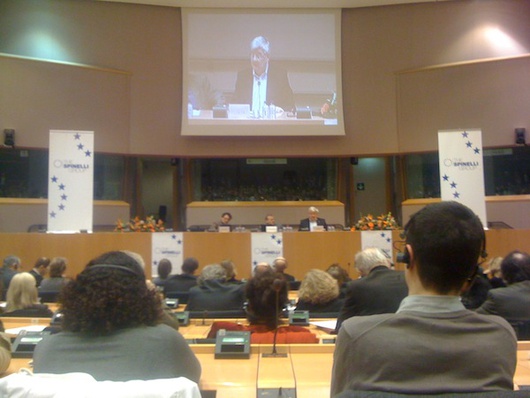
The United States of Europe debate
Published on
Erasmus exchanges are fun, we all know that much. They’re also pretty much as diverse as the range of participants.
For example, take someone who does a bit of SWOT analysis before departure, tries to take full advantage of all of the opportunities at hand and is willing to share some his experience with others and you just might stumble upon a comprehensive account of a debate on European federalism recently (12 January 2011) held in Brussels. Brought to you by Matic Bitenc, a student of European studies from Slovenia, currently spending a year in Lille.
By Matic Bitenc
One of the reasons why I decided to spend my Erasmus student exchange year in Lille was the city’s excellent location. While it leaves a bit to be desired weather wise, it’s very conveniently nestled between Brussels, Paris and London. In fact, Brussels is no more than half an hour away by train.

Thus I was very pleased to take advantage of that fact when I received an invitation to a debate about European federalism organised by the Spinelli group in the European parliament in Brussels. The Spinelli group is an assembly, mostly consisting of European politicians and officials who believe that the solution to the global challenges facing us all is a more tightly integrated European Union, preferably along federalist lines. While that alone might not have gotten me to come, the names of Joschka Fischer, Daniel Cohn-Bendit and Jean-Marc Ferry on the debate panel provided the much needed motivation. Seeing the names of some friends on the registration e-mail list added much impetus too, as I was looking forward to seeing them again.

So lets take a look at some of the main issues that were discussed.
State sovereignty
The organisers wisely chose panelists with different views who wouldn’t blow in an entirely same horn. Jean Marc Ferry for example is quite opposed to a supranational state and fixed upon a return of autonomy to the people, state, the economy. He talked about a shared sovereignty, a co-sovereignty leading to co-responsibility in his words. To me it sounded as quite an empty term without a realistic basis in the background. He shared some ideas about the many national parliaments being originators of ideas, with the European parliament simply acting as a clearing house for them. Well, simply might be a poor choice of a word, as in reality such a system would be, in my view, anything but simple or effective. While I agree with a lot of his criticism of the European democratic deficit in terms of popular legitimacy, I see his view of the subject more as an attempt to regain some of nation state’s glory and autonomous powers without letting go of all the advantages supranationalism has brought us. Somehow. How French.
Joschka Fisher I think really got to the crux of the transfer of sovereignty debate. He started out by bringing attention to the fact that the transatlantic West is losing its global supremacy it held for so long. While that might be something that even the birds on the roof are already singing, as we say in Slovenia, understanding the effect of that process on national sovereignty is crucial. The core and substance of sovereignty is basically autonomous power. Can you take a decision and bring it to fruition in reality? With the economic and political rise of Asia, Europe is losing its clout in the world and its decisions matter less globally if they are even realised. National sovereignties are many times an illusion. Effectively sovereignty is being transferred to Asia with an economic process, whether we like it or not. Case in point being the Copenhagen climate summit where EU countries were left out of the room and USA and China were the ones really discussing things.
Thus we should reach over our petty nationalisms that keep us from pooling sovereignty further in the European Union. Only so will we be able to regain the European influence in the world, by speaking in one voice. This principle applies not only directly to foreign policy but to almost every other area, economy, research, anything with global implications really. As Jean-Marc Ferry wisely pointed out, that’s why globalisation is probably the main “selling point” of the European Union for the 21st century, much like keeping peace in Europe was after the second World War and most of the 20th century.
 Debate panel with Joschka Fischer speaking
Debate panel with Joschka Fischer speaking
Democratic deficit
The question of the EU’s democratic deficit was constantly being brought up in one form or another. The problem probably lies less in the institutions (although they do account for their share of the problem), but more in the European mindset, emotional response to the EU. Or better put, the lack of those two. We’ve got the European parliament, but voter participation in elections declines year after year. We’ve got the EP, but more power lies with the Council. We’ve got the EP, but we don’t have proper European parties, more groupings of national parties. Same with elections, it’s more of a sum of national elections, where people vote on national issues instead of the European ones, because they aren’t really the ones being brought forth.
Which brings me to the lack of a proper European public sphere, that Jean-Marc Ferry as a Habermas aficionado also pointed out. The lack of proper pan-European media, apart from the rare exceptions usually co-funded by the EU. This also means we’re not discussing the same European issues at the same time, which we should. People feel disconnected, estranged from the EU project. While there are many reasons for this disconnect, some were pointed out more. The top-down principal of European integration for example, feeling of it being forced down by some elites (which is inevitable to a point in my view).
Joschka Fischer talked a lot about the emotional dimension, how people need to relate more to the EU. In my opinion the complexity of the EU adds a lot in that detachment. The fact that I need to study this to understand the institutional framework of the EU says a lot. While I understand the need for checks and balances and political compromises, I still think the entire framework could be simplified a lot. Every citizen should be able to understand the basics of how EU politics work without the need to spend a lot of time and energy on it. Aside from that, the achievements and goals of the EU should be clearly communicated. Not in some diplomatic jargon due to the fear of rustling someone’s feathers. Clearly. The way citizens interact with the EU should also be improved. Make it a one stop shop. Why do we have different representations of the Parliament and the Commission? While the institutions are of course separate, the citizen interacting with the EU regarding some issue shouldn’t care. Deal with it internally, hide the complexity from the user, i.e. the citizen. The EU needs better usability on all levels is what I’m saying.
The debate was interesting, even-though I get the feeling the participants could have listened and actually interacted with each other more. Was it fruitful? Well, despite the completely full auditorium it seemed to me that they were preaching to the choir of already convinced. debates like this are only useful if they lead to some concrete action from the mindshare gained. While I have my doubts, I do hope the Spinelli group with its high placed members has some more of concrete action up their sleeves.
Interested? More topics covered by Matic are available at http://www.bitenc.eu/



